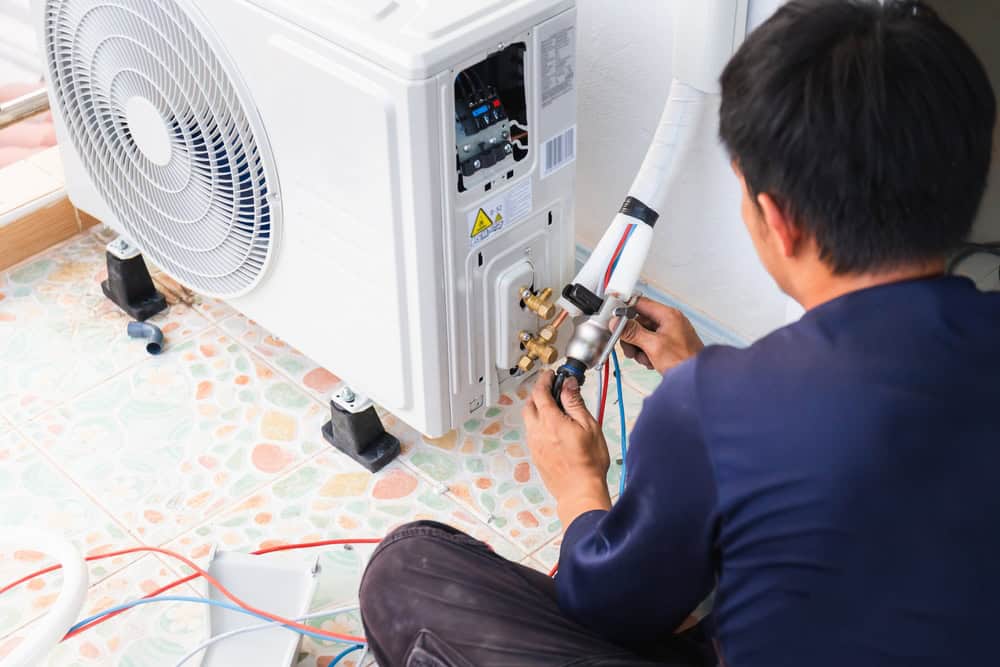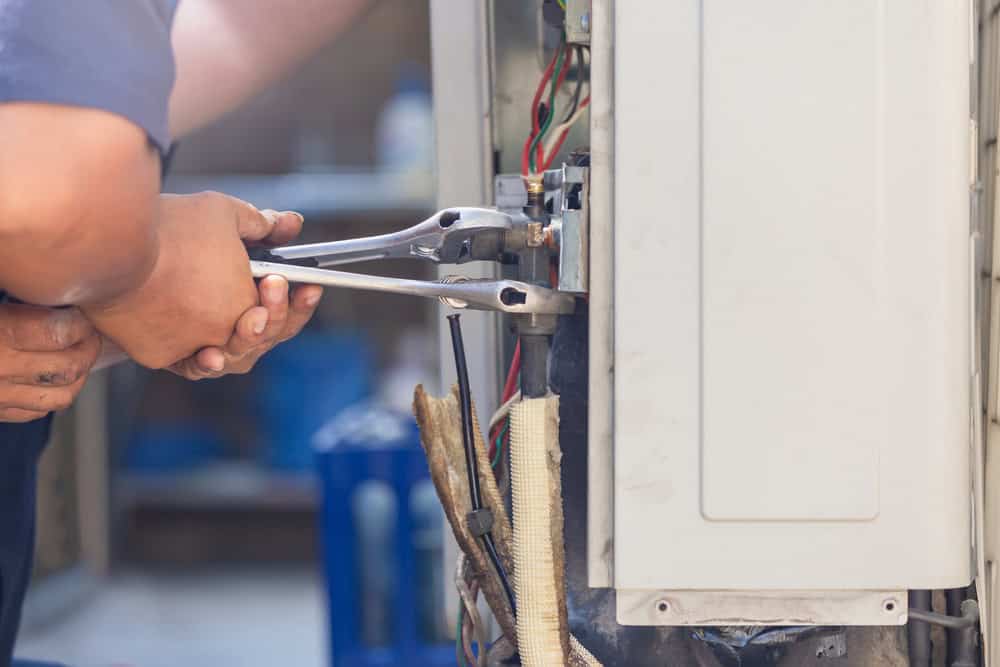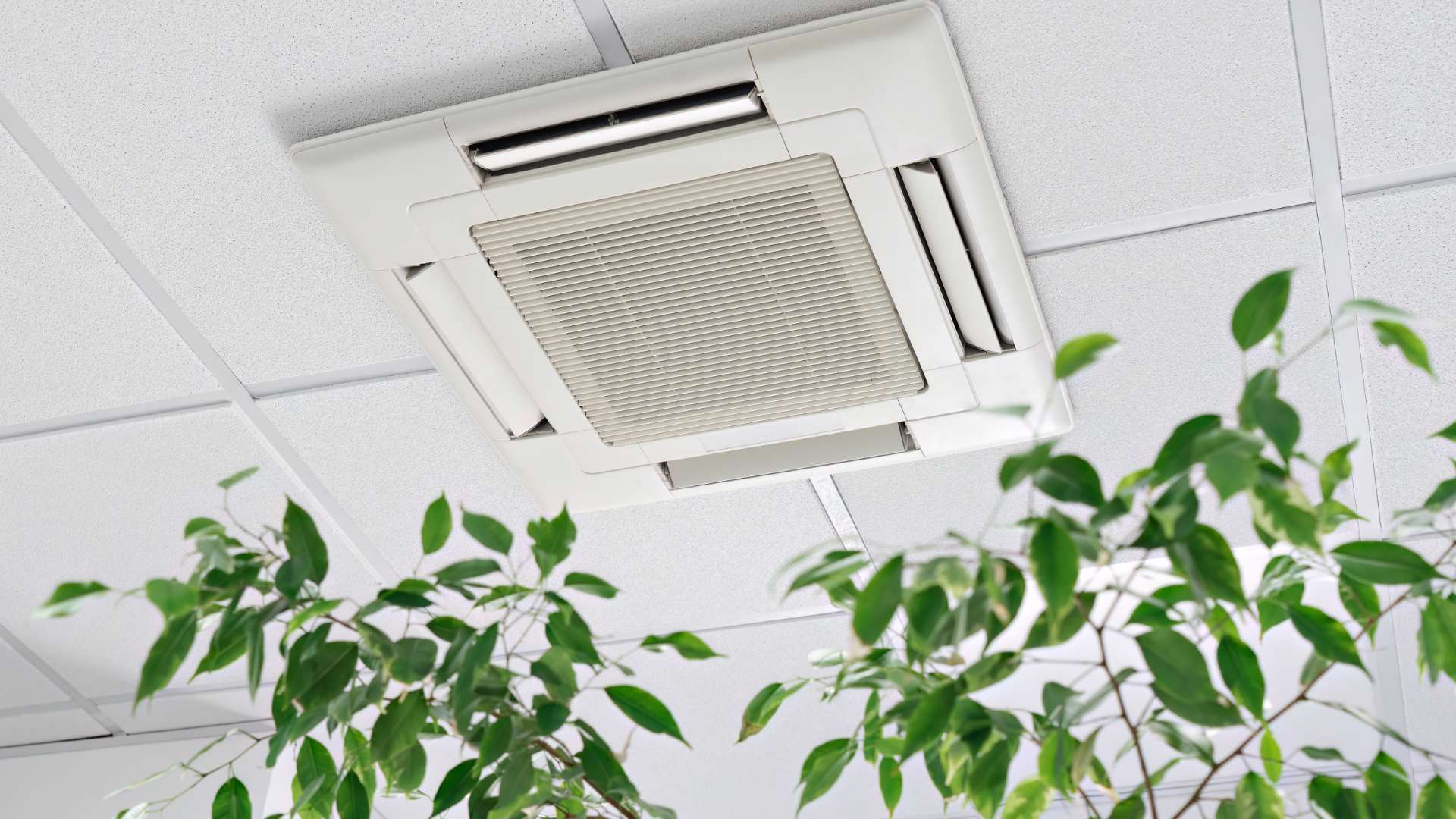In your quest for healthier indoor air, you may be on the lookout for the most effective air filtration system. With a range of high-tech options available, determining the best fit for your home can feel overwhelming. That’s why we’ve compiled six popular types of systems, along with their pros and cons, for your consideration.
Portable HEPA Purifiers
High-efficiency particulate air (HEPA) purifiers pull air in using a fan. The densely woven filter inside captures particulate matter like dust, pollen, pet dander, mold spores, and even some bacteria. HEPA purifiers use filters with the highest ratings on the minimum efficiency reporting value (MERV) scale, coming in at MERV 17 to 20. At these ratings, HEPA filters remove at least 99.97% of particles down to 0.3 microns in diameter.
Pros
HEPA filters are effective and versatile, capturing a wide range of airborne particles for asthma and allergy relief. Portable designs can be set up anywhere for extra air cleaning wherever you need it.
Cons
HEPA filters require regular replacement, which adds to the unit’s long-term cost and maintenance. While highly effective at trapping particles, HEPA purifiers aren’t effective against gases and odors unless combined with other filtration technologies. You can install a HEPA filter in your HVAC system, but the equipment must be compatible. These filters are denser than most and may detrimentally restrict airflow in systems not designed for them.
Upgraded HVAC Filters
Because of the airflow limitations of HEPA filters, you may want to install a filter with a mid-range efficiency rating between MERV 8 and 13. As air circulates through your HVAC system, these enhanced filters trap pollutants, including dust, pollen, and other allergens as small as 1.0 to 0.3 microns in diameter.
Pros
Upgraded HVAC filters are far better at removing microscopic particles than standard MERV 1 to 4 filters. The key difference is the filter’s tighter weave and pleated design. At the same time, upgraded HVAC filters maintain adequate airflow for optimal efficiency, maintaining HVAC performance and extending the system’s lifespan.
Cons
Make sure your HVAC system can handle the denser material of higher-rated filters before installing one. Without a high enough fan speed, you could encounter comfort problems and higher utility bills. In addition, these filters need to be checked and replaced more frequently than standard ones because they accumulate debris more quickly, adding to your maintenance costs.
Adsorbent Purifiers
Adsorbent purifiers use materials like activated charcoal to capture gases and odors from the air. Unlike mechanical filters, these purifiers rely on the adsorbent’s surface to attract and hold onto molecular contaminants. This process is particularly effective for absorbing volatile organic compounds (VOCs) and odors, making the air smell fresher and cleaner.
Pros
Adsorbent purifiers tackle gaseous pollutants that typical filters can’t, making them an excellent choice for urban homes or residents with sensitive noses. They also don’t produce harmful byproducts, making them safe to use in residential settings.
Cons
Adsorbent purifiers are not all-encompassing solutions because they don’t capture particulate matter. This means they must be paired with other types of air purifiers to comprehensively improve the air quality.
Ionic Purifiers
Ionic purifiers emit a stream of negative ions into the air. These ions attach to positively charged airborne particles, such as dust and pollen, making them heavier so they settle on surfaces. There, they can be dusted, swept, or vacuumed up. The purifier also actively draws in positively charged particles, which cling to collector plates within the unit.
Pros
Ionic purifiers have a filterless design, eliminating the need for regular filter replacement and reducing maintenance costs. Simply wipe off the collector plate periodically to clean it. These purifiers also operate quietly for a peaceful home environment.
Cons
Ionic purifiers are less effective than HEPA filters at capturing the smallest airborne particles. Settled particles also require regular cleaning, or they will redistribute into the air. But the biggest concern is that ionic purification produces ozone as a byproduct, which can harm lung health. Because of this, ionic purifiers may not be suitable for home settings.
Germicidal UV Lamps
Ultraviolet (UV) light, specifically UV-C, has impressive germicidal effects. When installed in your ductwork, the powerful light deactivates bacteria, viruses, and other pathogens that blow by, damaging their DNA and preventing them from multiplying.
Pros
Germicidal UV lamps target and neutralize microorganisms, preventing the spread of airborne diseases. This makes them a valuable addition to your HVAC system, particularly during flu season.
Cons
UV lamps are only effective against microorganisms and do not trap particulate pollutants like dust or pollen. Regular bulb replacement is also necessary to ensure continued effectiveness. In addition, some models produce ozone, which is harmful when released indoors.
Air Scrubbers
Air scrubbers can be installed within the HVAC system or used as portable units. These scrubbers filter the air to remove particulate matter while simultaneously treating it with UV light, effectively sanitizing the air as it passes through. Some advanced models even release particles that cling to and remove contaminants from surfaces throughout your home, from countertops to doorknobs.
Pros
Air scrubbers provide a comprehensive, whole-home solution for a thoroughly clean indoor environment. Their dual-action capability of removing particles from the air and surfaces is especially beneficial for households concerned with germs and allergens.
Cons
Air scrubbers require professional installation for effective performance. They also need regular maintenance, including UV light and filter replacement.
Breathe Easier with First Response Heating & Cooling
If you’re ready to improve indoor air quality with an advanced home air filter, turn to First Response Heating & Cooling. Drawing on over 40 years of experience, our locally owned family business is ready to help you breathe easier at home. We offer a variety of indoor air quality packages tailored to your needs, including upgraded air filters and advanced air scrubbers.
To request an air quality assessment and professional recommendations, please call us at 866-557-0089. Together, we’ll create a healthier, more comfortable home for you and your family in Harford, Baltimore, or Cecil County.




